There are several diseases and conditions that can affect your vision and eye health as you age. Eye cataracts, for example, are common and readily corrected with surgery. Other eye conditions have a greater potential to impact our quality of life, including glaucoma, macular degeneration and diabetic retinopathy.
The good news is better eye health services, preventive strategies and advances in technology can help us manage age-related vision changes and stay active and engaged even as our vision declines. The earlier these problems are detected and treated, the better your chances are of maintaining good vision.
Eye Health Conditions and What To Watch For
Here are a few more details about common, age-related eye health conditions and diseases from the National Eye Institute (NEI):
| Age-Related Macular Degeneration (AMD) | AMD gradually destroys sharp, central vision. Central vision is needed for seeing objects clearly and for common daily tasks such as reading and driving. |
| Eye Cataract | A cataract causes vision loss due to a clouding of the lens in the eye. You may notice your vision is cloudy or blurry, colors appear faded or a lot of glare. |
| Diabetic Eye Disease | A complication of diabetes, diabetic eye disease is a leading cause of blindness. The most common form is diabetic retinopathy which occurs when diabetes damages the tiny blood vessels inside the retina. |
| Glaucoma | Glaucoma is a group of diseases that can damage the eye’s optic nerve and result in vision loss and blindness. It is usually associated with high pressure in the eye and affects side or peripheral vision. |
| Dry Eye | Dry eye occurs when the eye does not produce tears properly, or when the tears are not of the correct consistency and evaporate too quickly. Dealing with dry eye can make it more difficult to perform some activities, such as using a computer or reading for an extended period of time. |
Low vision, which impacts millions, means that even with low vision aids like regular glasses, contact lenses, medicine or surgery, people find everyday tasks difficult to do, including:
- Reading the mail
- Shopping
- Cooking
- Watching TV
- Writing
Eye Doctor Visits: Schedule a Regular Eye Exam
Regular eye doctor visits can help you stay on top of changes in your vision and monitor for eye disease. If you wear glasses, they’re also a good way to be sure you have the right prescription. Not having the right prescription can contribute to eye strain and fatigue. While not specifically an age-related problem, eye strain and fatigue can negatively affect vision.
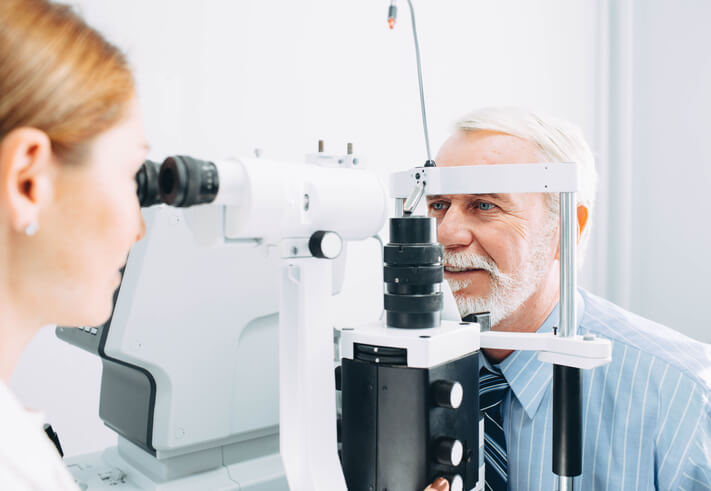
Mark your calendar: The National Eye Institute recommends annual eye exams for everyone over 50, as eye diseases often have few symptoms.
The Primary Care Doctor: Eye Health and Physical Health Go Together
Your eye health and physical health go together, so an annual physical is important too. Managing and monitoring for diabetes, for example, can help stave off vision loss associated with that disease. As part of an annual eye doctor visit, doctors routinely use an ophthalmoscope to check for eye diseases. They also check eye function like peripheral vision.
Declining vision can also be the result of systemic health problems like high blood pressure and diabetes. These conditions may be diagnosed or become more problematic as we age. For that reason, it’s important to keep your eye doctor or family physician informed about:
- Health conditions
- The use of any medications and nutritional supplements
- Your exercise, eating, sleeping and lifestyle choices
The earlier these problems are detected and treated, the better your chances are of maintaining good vision.
How To Keep Your Eyes Healthy: Protect and Preserve
Though we can’t stop the aging process, there’s is a lot we can do to maintain our eye health and vision as we get older. To help keep your eyes as healthy as possible for as long as possible, you can easily add these simple steps to your daily routine:
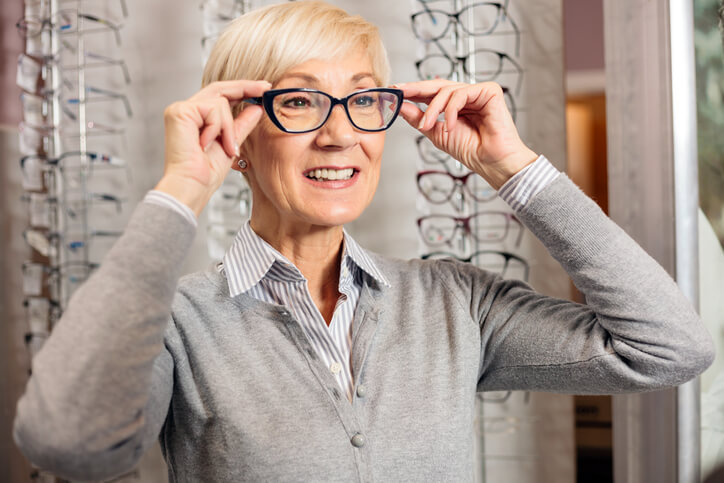
Proper Sunglasses Protect Against Sun-Related Damage
Protecting your eyes from the sun is an important part of eye health. Long hours in the sun without eye protection can cause cataracts to develop and contribute to growths on the eye, including cancer, according to the American Academy of Ophthalmology. Wear sunglasses anytime you are outdoors, particularly during the summer, at the beach or while boating. This is especially important when using medications that cause light sensitivity. When shopping for sunglasses, keep in mind that the best sunglasses offer 100% UV absorption.
Eye Health and Sleep Go Hand-in-Hand
Our eyes clean and lubricate themselves with tears when we blink. Because they are closed during sleep, they enjoy continuous lubrication. In this way, eyes can clear out irritants such as dust, allergens or smoke that may have accumulated during the day.
While it’s important that we protect our eyes from over-exposure to UV light, our eyes also need exposure to natural light every day. This helps regulate our biological clocks and maintain normal sleep-wake cycles. These cycles help ensure we get enough quality sleep, which helps our body, and our eyes, rejuvenate.
The Screen Time 20-20-20 Rule Reduces Eyestrain
Americans are spending more time in front of a screen than ever. Computer work gets harder as we age due to presbyopia. This condition causes the lenses in our eyes to become less flexible. Staring at screens can cause discomfort because our eyes must focus and refocus all the time. They move back and forth as you read. You may have to look down at papers then back up to type. Your eyes react to changing images on the screen so your brain can process what you’re seeing. Unlike a book or piece of paper, the screen adds contrast, flicker and glare which results in discomfort.
To reduce eyestrain, the NEI recommends the 20-20-20 rule: Every 20 minutes, look away, about 20 feet in front of you, for 20 seconds.
Eating Right for Eye Health
As children, we learn that carrots are good for your eyes. But eating a diet rich in fruits and vegetables, particularly dark leafy greens is important for keeping your eyes healthy, too, according to the National Eye Institute. For eye health, consider eating more leafy greens like:
- Spinach
- Kale
- Collard greens
A recent study found that oxidation and inflammation may contribute to an assortment of age-related eye diseases, so eating these antioxidant-rich foods combats that. Research has also shown there are eye health benefits from eating fish high in omega-3 fatty acids, like:
- Salmon
- Tuna
- Halibut
No Smoking
Smoking harms nearly every organ in your body, including your eyes. People who smoke double their chances of developing macular degeneration and are two to three times more likely to develop cataracts, according to the Centers for Disease Control and Prevention.
Exercise To Reduce Common Eye Ailments and Improve Eye Health
Good blood circulation and oxygen intake are essential to eye health and both are stimulated by regular exercise. Exercise also helps manage weight, which reduces the risk of diabetes and diabetic retinopathy, according to the American Academy of Ophthalmology.
Several studies over the last 10 years have found connections between regular exercise and a reduced risk for other common eye ailments, such as:
- Cataracts
- Age-related macular degeneration
- Glaucoma
Vision problems and eye disease can also stem from high blood pressure and high cholesterol. A healthy diet and regular exercise are two of the most important steps you can take to lower both and protect your eye health.
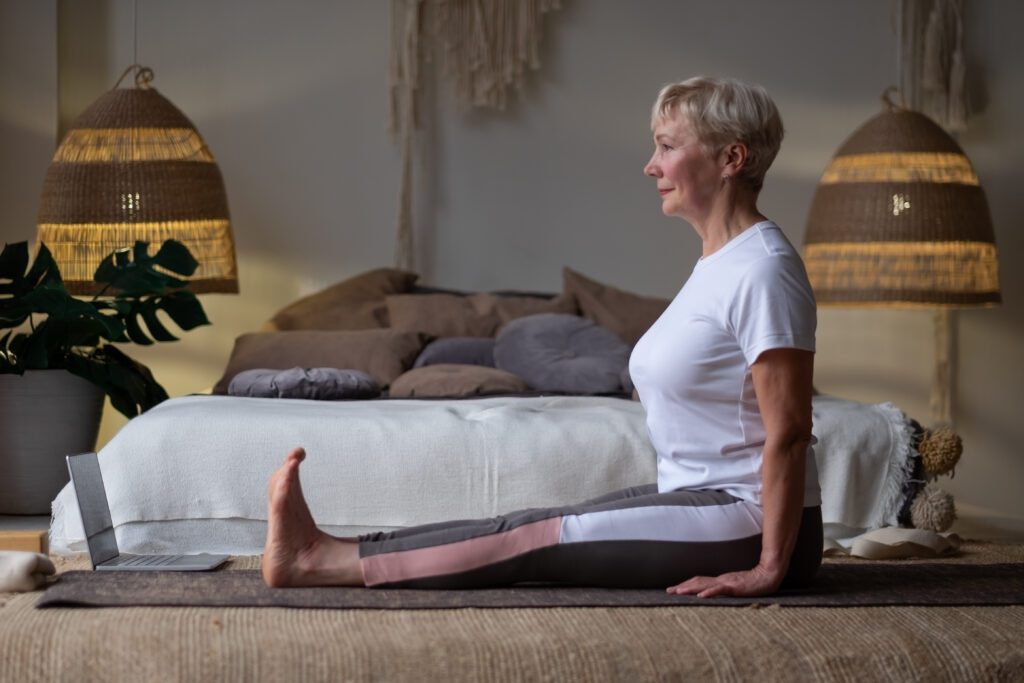
Practice Good Contact Lens Care
As we age, our eyes tend to get dryer, making it more difficult to wear contact lenses. Silicone hydrogel lenses have expanded options for older adults. Contact lenses are also being used to correct presbyopia, the age-related inability to see clearly at near distances.
If you wear contact lenses, hand washing is the most important step in keeping your contact lenses and eyes healthy, says Christine Sindt, an optometrist, and director of the Contact Lens Service at the University of Iowa. Think about all the germy things you touch throughout the day: countertops, door handles, cellphones and more. Those microbes will transfer from your fingers to your contact lens and then to your eye. This can cause huge problems for your eyes, like nasty infections that may damage your sight. Disinfect contacts as instructed and replace them as appropriate, advises the NEI.
Dealing with Low Vision and Vision Loss
Having to squint to read small print is considered a normal progression of our eyesight through middle age, and beyond, as our eyes undergo changes. For those whose vision loss declines beyond normal, age-related changes, there is hope. Low-vision aids and rehabilitative eye health services can help keep you active and independent. These services provide a range of techniques that allow you to perform daily tasks with your available vision.
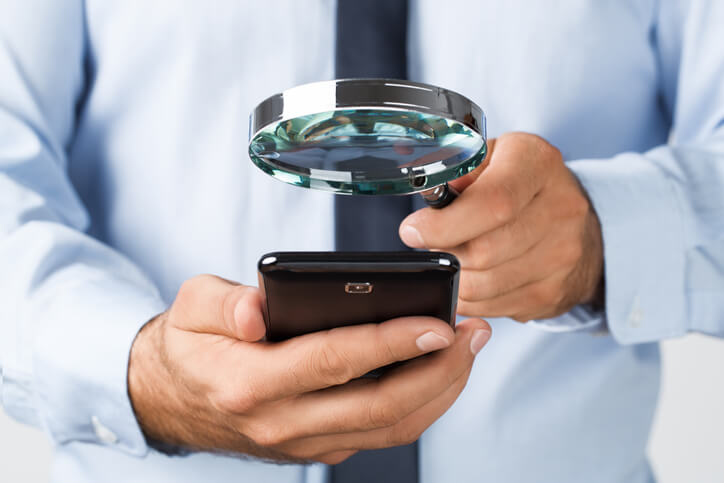
An optometrist can help you plan a rehabilitation program that will allow you to live as independently as possible within the limitations of your condition. A variety of low vision aids are available to assist individuals with low vision.
Here are a few of the more common ones, according to the American Optometric Association:
- Spectacle-Mounted Magnifiers: Lenses are mounted to glasses or on a special headband. This frees up both hands to complete a close-up task, such as writing a letter.
- Handheld or Spectacle-Mounted Telescopes: These miniature telescopes help people with low vision see longer distances, such as across the room to watch television. They can be modified for close-up tasks, such as reading.
- Handheld and Stand Magnifiers: These are convenient for short-term reading tasks, such as viewing price tags, labels and instrument dials. Both types can include lights.
- Video Magnification: Tabletop or head-mounted systems enlarge reading material on a video display. Some systems can be used for distance viewing. They are portable, and some can be used with a computer or monitor. Users can customize brightness, size, contrast and color.
Other low vision products include:
- Talking wristwatches
- Self-threading needles
- Large-type books, magazines and newspapers
- Books on tape
- Aids to computers more low-vision friendly, like special keyboards, monitor magnifiers and speech recognition programs
Conclusion
As we get older, our vision changes along with the rest of our bodies. Poor vision, however, does not have to be a part of the process. Knowing what to expect and employing the many strategies available to keep your eyes healthy for as long as possible can help keep the world and our lives in focus. Here’s looking at you, kid.


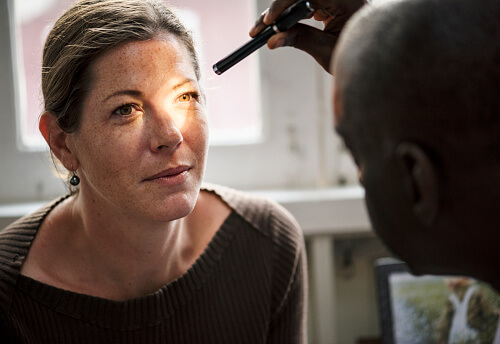

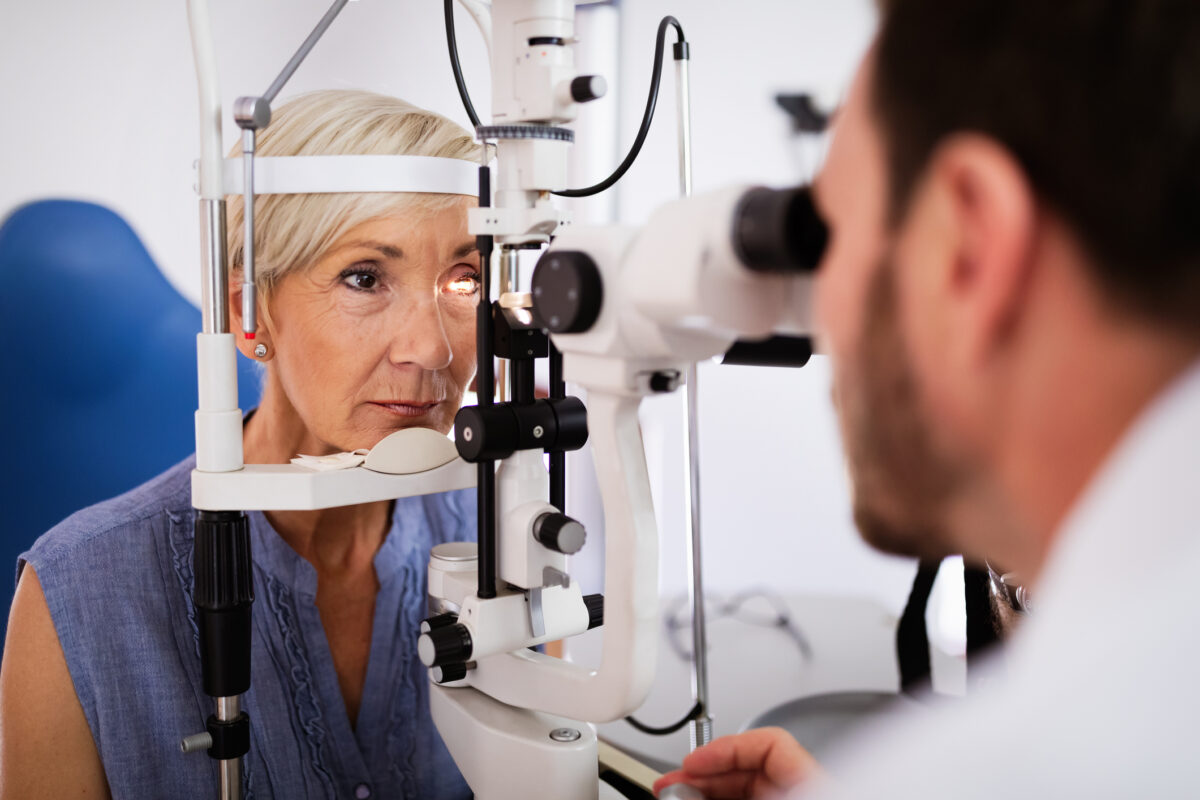
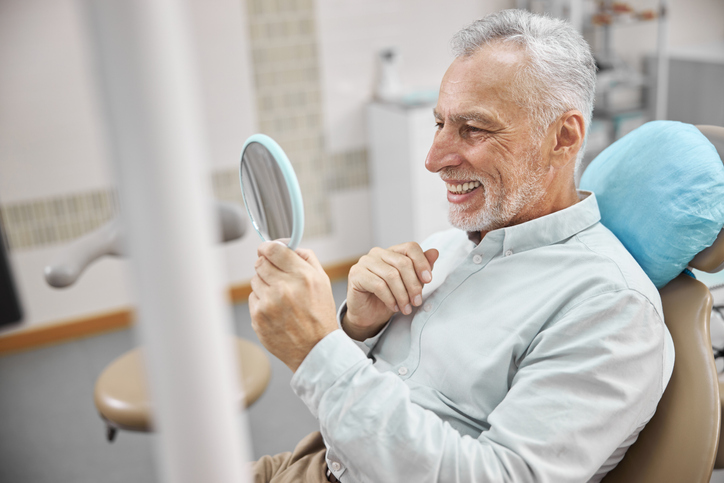

I am in my mid-thirties and I generally have good vision. Though, I do have elevated blood sugar levels. I didn’t know that diabetes could actually affect eye health and would even cause blindness. I might have to go see a doctor soon when I clear my schedule.
I was surprised that this article did not include information about retinal tears and detachments which are more and more common in older eyes. Anyone is susceptible and the symptoms are not necessarily dramatic until damage worsens.
thank you and will stay alert for your comments. Mark
It’s great that you elaborated on the relationship between exercise and proper eye health, especially in relation to conditions like glaucoma. These kinds of conditions are always what my friends and family tell me to worry about as a man of my age, and I wanted to take their warnings seriously somehow. In addition to looking for a regular optometrist that I can visit, I’ll definitely incorporate more exercise into my daily routines.
I appreciate the advice given on Health check ups and Eye examines how hand and hand I only have glasses for reading and didn’t return to the eye doctor until 6yrs later and my prescription had increased because my vision decreased tremendously I tried driving without my glasses and put them on and noticed a big difference when I’m driving I can now see peoples license plate numbers and signs before I come upon them a lot clearer I wasn’t aware that the eyes need daily natural light Thanks for all the informative information
I like what you said about how regular eye doctor visits can help one check accurately the changes in their vision and also to monitor for eye disease. Since I’m wearing glasses, I’m worried that my vision will continue to get blurry. I had no idea that declining vision can be a result of systemic health problems, which is something that happened to my grandma. Since you mentioned going to eye check-ups, I think I shall find potential eye doctors first in our area because we recently moved in Adelaide.
Thank you for such good information, like to learn different things about staying healthy!!
This really hits home for me. Just recently diagnosed with Cataracts, went for surgical exam found out I have pressure on back of my optic nerves.Learned something thou. Thanks